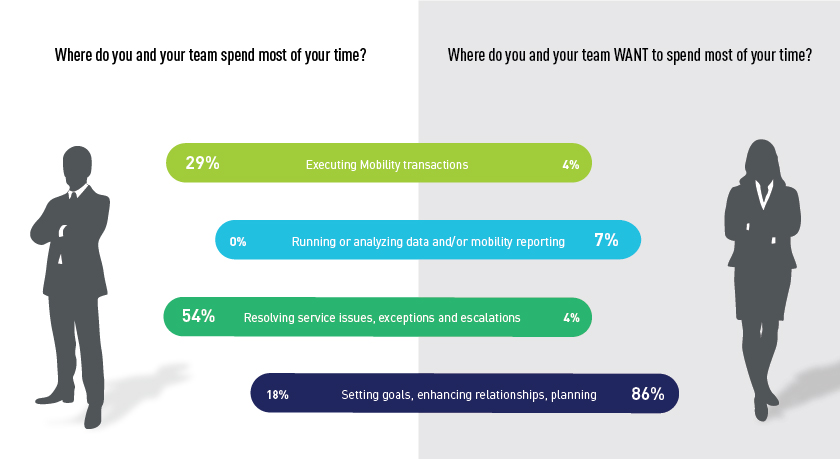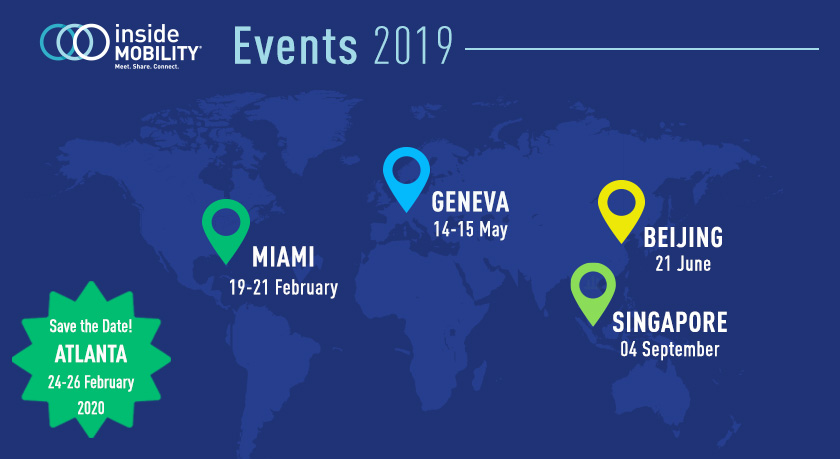insideMOBILITY® Geneva 2019 Event Highlights
The insideMOBILITY® 2019 series continued in Geneva last week with over 40 delegates gathering in Geneva to discuss and share the latest insights in the Mobility industry! Representatives from 38 companies across EMEA participated in sessions and peer-to-peer roundtables covering topics such as transforming the mobility value proposition, mastering the art of negotiation, the future of technology in mobility, how blockchain technology is poised to shake up the Mobility industry, optimizing stakeholder engagement, creating a business case for change, diversity and inclusion in the workplace and the ever-important employee experience. Here are the key highlights:
How are you using technology to transform Mobility?
When asked if technology is a priority in Mobility initiatives, attendees answered with a resounding ‘yes’. Natalie Campbell, Vice President of Implementation Services at Graebel, highlighted important aspects to consider when evaluating new technology and shared some of the new tools that are out there. As Mobility teams continue to embrace technology as a standard for the future, it’s important to ask (and answer) these questions when vetting new products:
- Does it add value to the organization? Does it track the right data, create efficiencies and inform decision making?
- Does it operate in real-time, allowing for real-time adjustments?
- Does it integrate with the HR IT ecosystem?
- Does it support efforts to measure Return on Mobility?
- Is it secure and compliant?
Blockchain technology poised to transform the Mobility industry
Technology continues to push the Mobility industry to change and adapt to keep up with the expectations and needs of our most important clients – our assignees.
Marc Bruins and David Lamers from Rabobank provided insight into one of the new innovations coming to the Mobility industry – blockchain technology. While most of us are familiar with bitcoin (or at least recognize the term), blockchain is new on the Mobility scene. Along with learning about the basics of blockchain technology, attendees learned how this latest innovation could:
- Elevate the employee experience by employees creating and controlling access to their blockchain validated portfolio of their own credentials
- Increase efficiencies for businesses by receiving access to a global talent pool with already verified credentials
- Allow HR and Mobility teams to reduce the administrative burden on teams and focus more on strategic initiatives
Mobility’s Role in Diversity & Inclusion
Often Mobility is presented with a move which doesn't always consider a wider pool of candidates assessed equally on individual merits. Approaches to gender, ethnicity, disability, sexual orientation and other different characteristics vary tremendously around the world and often by industry or company. Since Mobility is charged with moving people and families across regions, it should:
- Help organizations to have a more inclusive approach to assignee selection
- Prepare the business and employees for these situations
- Develop support mechanisms as needed for both assignee and family members
- Help impacted individuals navigate barriers – legal, regulatory, tradition-driven and others
Mobility policies should be inclusive and relevant to and supportive of all people. One fundamental question that attendees focused on during the peer-to-peer roundtable discussions was whether to create this fairness through case-by-case exceptions or revising policies overall to make them more generally appropriate.
Transforming the Employee Experience
Mobility is charged with optimizing each relocation experience. Programs are continuing to transform – especially to improve the non-service aspects of a relocation experience and tie to the wider employee journey:
- In addition to surveying assignees about the relocation services, programs are asking about how the assignment did or didn’t meet their goals and expectations
- Assessing assignee readiness and family readiness prior to a move have been identified as crucial to the success of an assignment
- Successful repatriations are a challenge in the industry and some programs have begun treating a repatriation situation in the same way as an assignment – utilizing briefings, site visits and other techniques
- Link Mobility processes to the broader organization's processes to create seamless transitions across each state of employment (such as selection, onboarding, development and assessment)
Where do Mobility professionals want to spend their time?
One question we continue to track at insideMOBILITY events is how Mobility practitioners actually spend their time compared to how they want to spend their time. Once again, we saw that Mobility professionals clearly want to better balance their day-to-day transactional focus with a more strategic approach.

insideMOBILITY Continues
The next scheduled insideMOBILITY event is set forJune 21st in Beijing, followed by our Singapore event on September 4th. If you’re an in-house HR, Reward or Mobility professional be sure to register today. Don’t miss this exciting opportunity to meet, share and connect!
